Learning how to sell crypto in Germany can be confusing. The country has unique crypto and tax rules.
However, we will explain the process step-by-step, demystify regulations, highlight the best crypto-selling platforms in Germany, and answer common questions. Let's get started.
What are the tax implications for selling crypto in Germany?
Cryptocurrencies are taxed in Germany differently from many other countries. While you don't have to pay tax on crypto assets held for more than a year, cryptocurrency taxes are levied against short-term (under one year) positions in the form of income tax.
German citizens benefit from a €256 exemption limit; earnings below this figure are not taxable.

Under the German Income Tax Act, the rate you pay on your tax bill will vary based on your income, ranging from 0% to 45%, in addition to a 5.5% solidarity tax.
The German Federal Central Tax Office (BZSt) considers cryptocurrency a private asset for crypto tax purposes.
When filing your tax return, you must declare crypto transactions unless you've earned less than €600 profit. Similarly, activities like crypto mining or staking, considered income, have a smaller €256 limit.
- There is no capital gains tax on positions held for over a year.
- You'll have to pay income tax on assets held for under a year.
- Tax rates on crypto profits are directly tied to your income tax bracket.
How is crypto regulated in Germany?
The cryptocurrency market in Germany is regulated by the Federal Financial Supervisory Authority (BaFin).

However, as a member of the European Union (EU), Germany must adhere to specific EU regulations and frameworks, like the 2023 Markets in Crypto Assets (MiCA) regulatory framework.
The German Banking Act (KWG) defines cryptocurrencies in the country as "digital representations of a value that has not been issued or guaranteed by any central bank or public body."
Moreover, while private investors can freely buy, sell, and trade crypto in Germany, the asset class is not considered legal tender in the country.
It's important to understand that although private citizens can freely engage in crypto transactions in Germany, crypto service providers like exchanges are regulated by BaFin.
Moreover, service providers must implement a Know-Your-Customer (KYC) verification system while following Anti-Money Laundering (AML) regulations.
- BaFin regulates cryptocurrency in Germany.
- Although private citizens can freely sell crypto, institutions must adhere to BaFin regulations.
- KYC verification is required in Germany.
How to sell crypto in Germany (step-by-step)
If you're wondering how to sell crypto in Germany, this easy-to-follow guide details the entire process.
We will discuss using one of the best crypto exchanges in Germany to sell crypto, but we've included another guide below explaining how to sell crypto on an all-in-one platform like swissmoney.
Step 1: Select a platform
Before you can sell crypto in Germany, you must consider your requirements and look at several platforms to find one that suits your needs.
Once you've selected a trustworthy, feature-rich exchange supporting your preferred cryptocurrency and withdrawal method, you must create an account and complete the Know-Your-Customer (KYC) verification process.
- Consider your requirements when selecting an exchange.
- Choose an exchange supporting your cryptocurrency.
- Check which withdrawal methods are available before registering.
📚Related: How to Choose the Right Crypto Wallet

Step 2: Deposit funds
Once you've completed the verification process, you must deposit funds into the exchange. You can do this by clicking the 'Deposit' button, copying the wallet address, and sending the crypto from your wallet to the exchange via on-chain transfer.
- Deposits typically arrive in a couple of minutes to a couple of hours, depending on the asset and network congestion.
- Make sure you deposit your funds to the correct address/network, or your funds will be lost.
- Ensure you have another crypto to cover any transaction fees.
📚Related: How and Where to Buy Crypto in Germany
Step 3: Sell crypto in Germany
After the deposit has arrived in your account, you can sell crypto in Germany.
Search for a trading pair denominated in your chosen cryptocurrency, then enter the amount to sell, the sale price, preview fees, and confirm the transaction.
The trade will be conducted as soon as your target price is hit.
- Always preview fees before a sale to avoid any surprises.
- Withdraw your money after selling crypto for safety.
- It's worth checking any platform limits before conducting a sale.
📚Related: How to Cash Out Large Amounts of Bitcoin
An all-in-one solution for selling crypto instantly - Discover swissmoney!
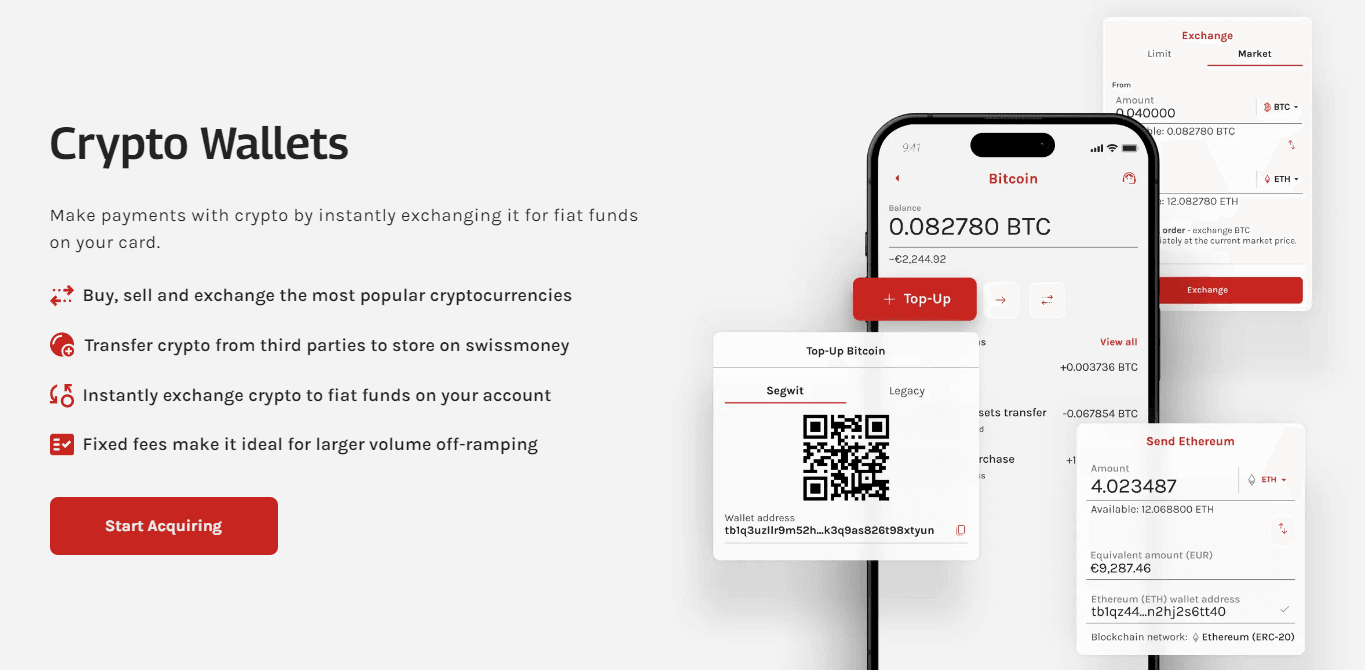
While an exchange is a suitable way of selling crypto, all-in-one platforms like swissmoney offer even more value, allowing you to buy, sell, and trade crypto while managing traditional finances on a single platform.
Moreover, swissmoney is FINMA-licensed and holds an Electronic Money Institution (EMI) license from the Central Bank of Lithuania, highlighting swissmoney's trustworthiness.
Outside of swissmoney, letting you sell and buy crypto in Germany, the platform boasts several other features designed to help you manage your finances:
Automatic onboarding
One of the most significant advantages of swissmoney is the platform's near-instant onboarding process. In contrast to some exchanges we've looked at that have extremely slow onboarding processes, swissmoney onboards the vast majority of users automatically and within just a few minutes.
Dedicated IBAN accounts
Swissmoney offers all users the ability to access four fiat currency IBAN accounts: EUR, GBP, USD, and CHF. Using these IBAN accounts, people can send/receive international payments and set up direct debits to cover bills.
Crypto debit card
swissmoney provides users with physical and virtual crypto debit cards that can be funded using crypto stored in their accounts. The card boasts no hard limits, making it perfect for people who get paid in crypto or want to conduct large purchases.
Free crypto wallet
To make it easy for customers to store their digital assets, swissmoney offers free crypto wallets for each asset the platform supports. You have complete control over assets stored on the platform, so you can deposit, withdraw, buy, sell, or trade crypto on swissmoney.
How to sell crypto in Germany with swissmoney
While you can sell crypto in Germany using an exchange, they often lack the tools for managing your fiat after the sale.
However, the all-in-one platform, swissmoney, provides all the tools needed to get the most from your crypto and fiat holdings. You can follow these instructions to sell crypto with swissmoney:
Step 1: Create and verify a swissmoney account
You must create a swissmoney account and complete the verification process to get access to the platform's features. Initially, you only need to provide a name, email address, and password.
You'll also need to provide personal details and take a picture of your photo ID via mobile to get full access to swissmoney.
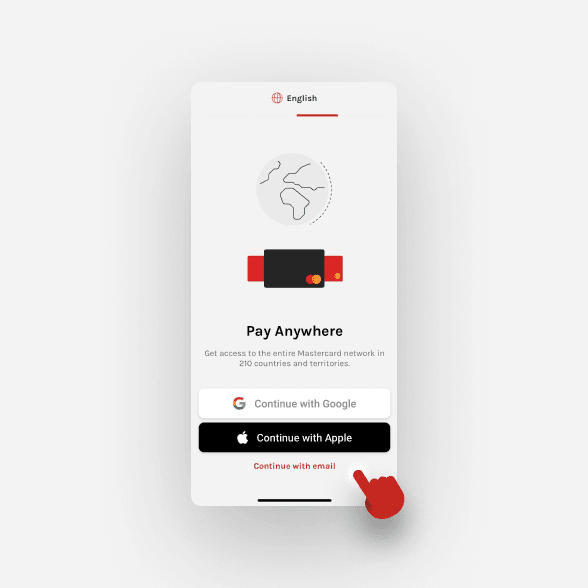
- You must complete verification to use swissmoney.
- It's possible to create a swissmoney account and complete verification later.
- The swissmoney onboarding process is fast and efficient.
Step 2: Add crypto wallets on swissmoney
On your swissmoney account, you need to add cryptocurrency wallets and fiat accounts to store your desired assets. By default, swissmoney offers a EUR account, so most German citizens can use fiat immediately. However, you must press the 'Add crypto currency' button, choose the relevant wallet, and press 'Add new.'
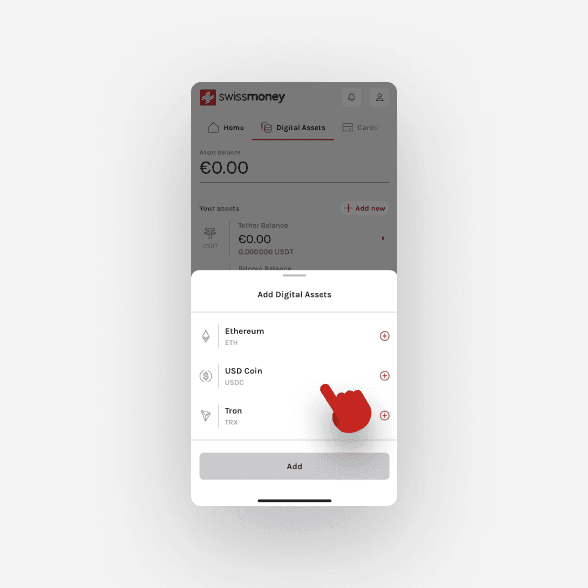
- You can add BTC, ETH, TRX, USDT, and USDC accounts to swissmoney.
- The platform supports EUR, GBP, USD, CHF, and AED.
- You can reorder your swissmoney cryptocurrency wallets for convenience.
Step 3: Deposit crypto
Click on the asset you want to sell, then copy the deposit address, paste it into your crypto wallet, and send an on-chain transfer to the target wallet.
You must ensure your deposit exceeds the minimum transfer amount, as lower amounts will be declined.
You should also double-check the deposit address and network before sending a transfer to avoid losing crypto.
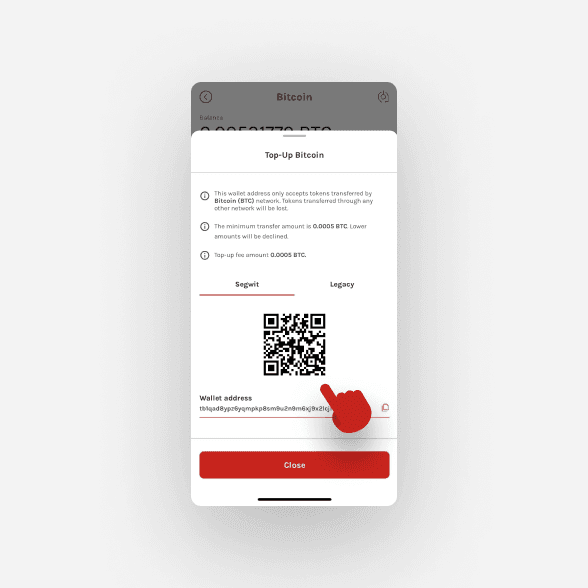
- Only send crypto to the correct network, or funds could be lost.
- Deposits typically take between a few minutes to a couple of hours.
- Check network fees before depositing and select a low-cost transfer time.
Step 4: Sell crypto in Germany
After completing your deposit, you're ready to sell crypto using swissmoney. Just click on the asset you want to sell, select 'Trade,' then press 'Crypto to fiat conversion'.
Choose between limit or market orders, enter the amount to sell, input your target price, preview fees, and press 'Sell' to confirm the transaction.
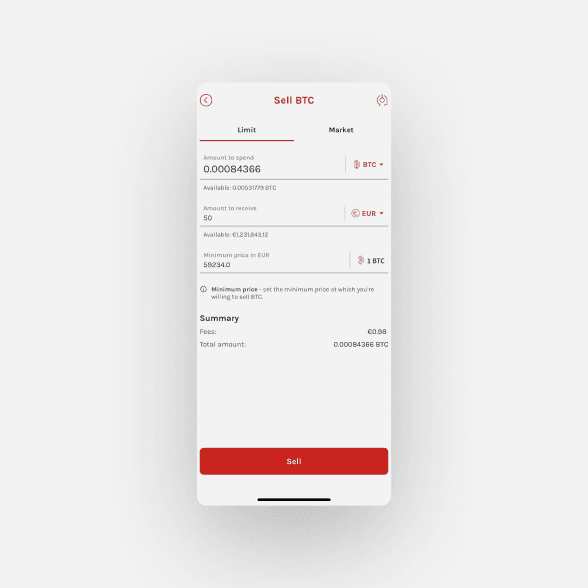
- The swissmoney order screen refreshes every 15 seconds to ensure pricing is up-to-date.
- Note your transaction details, as you could be subject to income tax.
- You can use a swissmoney debit card or IBAN account to spend fiat after selling crypto.
What are some alternative ways to sell crypto in Germany?
While using an exchange or all-in-one platform are two of the most common methods for selling crypto in Germany, there are a few other techniques you can use:
Peer-to-peer platform
A Peer-to-Peer (P2P) platform is a great way to sell crypto without a centralized exchange. The platforms support many payment methods and allow the seller to dictate all the terms of the sale.
However, finding a buyer can take a long time, meaning P2P platforms aren't great where time is a priority.
Pros:
- Decentralized
- Many payment methods
- Can be anonymous
Cons:
- Time-consuming
- Fewer supported cryptos than an exchange
Bitcoin ATM
Using a Bitcoin ATM is a sound option to sell cryptocurrency offline. Despite the name, some Bitcoin ATMs support altcoins like Litecoin or Ethereum, making them surprisingly flexible. However, Bitcoin ATMs usually charge high fees or have low limits, reducing usability.
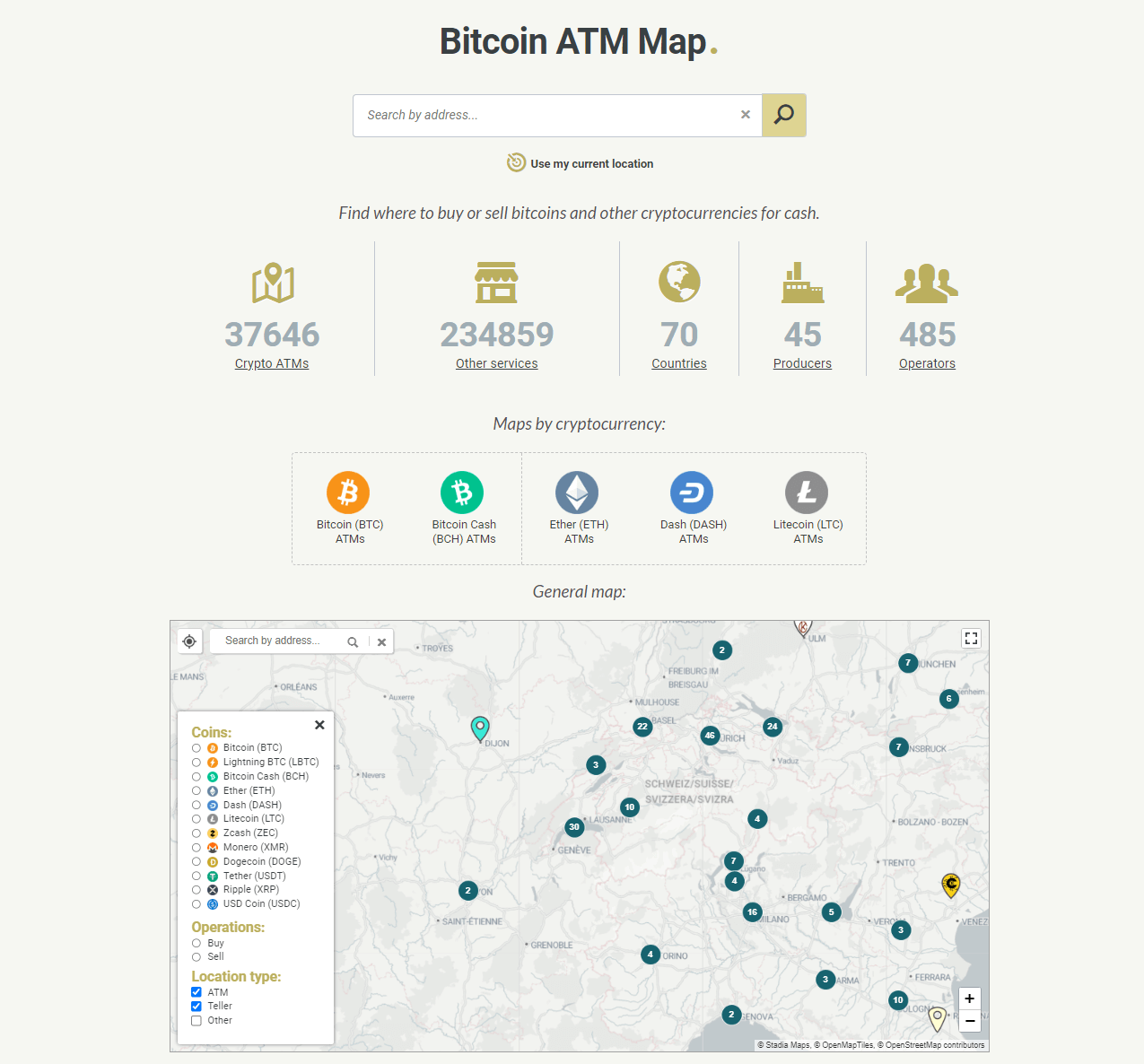
Pros:
- Offline
- Fast sales
- Support for several assets
Cons:
- High fees
- Must travel to a location in person.
OTC Desk
Over-the-counter (OTC) desks are ideal for people wishing to conduct a high-value sale. They are typically reserved for large transactions, as the desk will provide a binding offer independent of market conditions.
However, using an OTC desk involves high fees, and you'll unlikely receive the full value of your assets.
Pros:
- Great for large transactions
- Offers are not linked to market conditions
Cons:
- High fees
- Reserved for large transactions
The most popular platforms to sell crypto in Germany
Germany is one of the most crypto-friendly countries worldwide, so there are many popular platforms for selling crypto within the region. Below, we've highlighted some of the top-rated and most-used:
1) Kraken
Kraken is one of the world's most popular exchanges. It boasts phenomenal security, 261 cryptocurrencies, and fees of 0.25% (maker) and 0.40% (taker). Kraken is a regulated exchange and requires KYC verification.
2) Bitcoin.de
Bitcoin.de is a native German cryptocurrency exchange that allows users to buy and sell ten popular assets. The platform boasts relatively high fees of 0.5% per transaction, but It could be suitable for people wishing to transact on a native German platform.
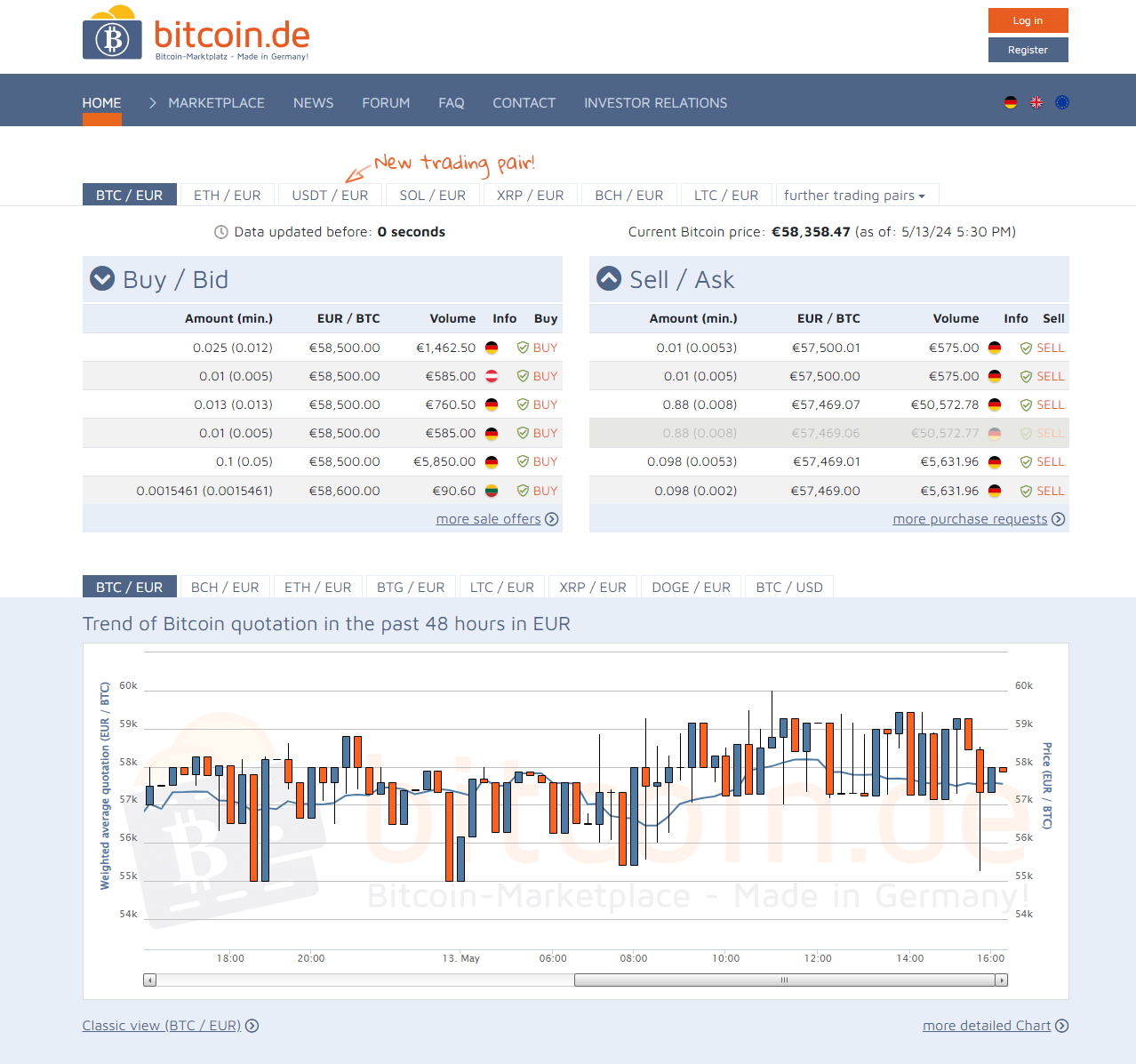
3) Paxful
If you want to sell crypto away from a centralized platform, a P2P marketplace like Paxful is the best option. The platform lets users buy and sell four cryptocurrencies using unique payment methods like gift cards. While buyers do not pay costs on Paxful, sellers must cover a 1% fee.
Platforms compared
| Platform Name | Supported Assets | Trading Fees |
| Kraken | 261 | 0.25% (maker) / 0.40% (taker) |
| Bitcoin.de | 10 | 0.5% |
| Paxful | 4 | 1% (sellers only) |
📚Read More: best platforms to convert crypto to fiat
Are there any security risks I should know when selling crypto in Germany?
Selling crypto is generally safe. However, the activity is not risk-free. We've listed a few common dangers to be aware of when selling crypto in Germany.
Fake platforms
One of the most common ways people get compromised is by accidentally signing into a fake platform. Scammers create counterfeit versions identical to legitimate sites to trick users into inputting their account details.
Bad actors often promote fraudulent websites via Google ads, so ensure you use the correct URL before inputting personal data.
Poor security
Another way people frequently have their accounts compromised is by lacking proper security measures. When creating an exchange account, you should always use strong, unique passwords.
Moreover, you should set up Two-Factor Authentication (2FA) and familiarize yourself with the best security practices.
Transacting safely
Outside of having their accounts compromised, one of the most typical ways people lose their funds when selling crypto is by transacting unsafely.
If you have a virus on your computer, it can automatically alter the deposit address you copy and paste into your wallet. It would be best to use anti-virus software and always double-check the transaction details before confirming the transfer.
📚Read More: crypto security guide

Conclusion
Learning how to sell crypto in Germany can be time-consuming, but after reading our guide, you'll have all the required knowledge.
We've discussed common risks, tax implications, German crypto regulations, and where to sell crypto.
However, after testing several platforms, we found that while exchanges are good for crypto, they lack fiat-centric tools.
On the other hand, financial services provider swissmoney provides a suite of advanced tools tailored to crypto and fiat, making the platform a great all-around option.
On swissmoney, you can buy, sell, trade, and transfer crypto. Unlike exchanges, you can also access a debit card and dedicated IBAN accounts, making swissmoney a highly versatile choice.
FAQs
Can I sell crypto in Germany?
You can sell crypto in Germany using several methods and platforms, such as P2P marketplaces, crypto exchanges, OTC desks, and all-in-one service providers.
How do I legally sell crypto?
To legally sell crypto in Germany, you must complete Know-Your-Customer (KYC) verification and use a regulated crypto exchange.
You must also report income generated from crypto on your tax returns. However, no rules directly impact private citizens' ability to sell crypto.
Is Germany crypto tax-free?
Crypto taxes in Germany are linked to income tax rates, meaning the more you earn, the greater your potential tax liability.
However, taxes only apply to crypto transactions that span less than one year. Germany has no capital gains tax, and investments held for over a year are exempt from taxes.
How can I sell Bitcoin online in Germany?
You can sell Bitcoin online in Germany using a crypto exchange or P2P marketplace, like Paxful. You'll need to create an account, deposit funds on the platform, and use the account to sell your assets for fiat currency or another crypto.
How can I sell Bitcoin for cash in Germany?
It can be tricky to sell Bitcoin for cash in Germany. However, using a P2P marketplace, you can find buyers close to you and organize an in-person trade for physical fiat money.
Typically, P2P marketplaces provide an escrow service that increases customer safety.
Is it safe to sell crypto in Germany?
Selling crypto in Germany is inherently safe. However, bad actors and fraudulent platforms can muddy the waters and cause danger.
You should only use reputable platforms with a track record of excellent service.
What happens if I lose my crypto after selling it on an exchange?
When you use an exchange to sell crypto, the platform swaps it for fiat or another crypto you've chosen. As such, while it can appear that your crypto has been lost, it's just been converted into another asset.
Once you've sold your crypto, you should withdraw the funds to a bank account or secure wallet for safety.
Where can I sell Bitcoin in Germany?
You have plenty of options if you want to sell crypto in Germany. You could use a popular crypto exchange like Binance and Coinbase or a P2P platform like Paxful.
However, using an all-in-one platform like swissmoney could be the best way to avoid limitations.
What are the fees for selling crypto in Germany?
The fees for selling crypto in Germany vary based on the asset, method of sale, and platform.
Typically, you'll need to cover network costs, trading fees, and withdrawal fees. However, you'll also need to pay taxes on your crypto income generated from positions held for less than a year.
Can you sell crypto anonymously in Germany?
Germany requires all crypto platforms to implement identity and KYC verification, making it challenging to sell crypto anonymously.
However, if you organize an in-person trade or use a P2P platform, you can set up a sale without providing identity documents.

